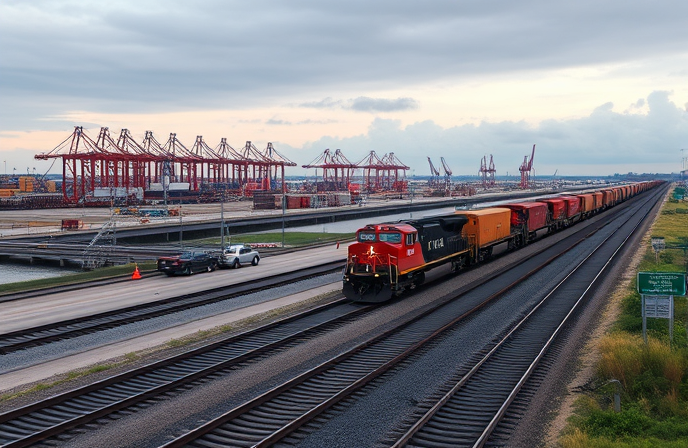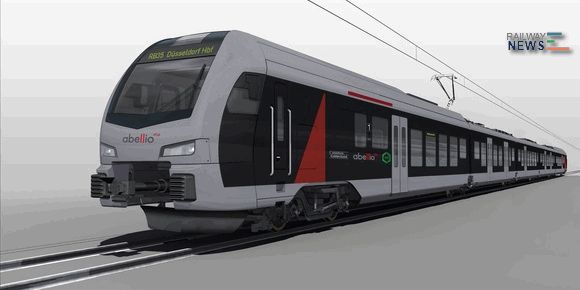TRASD-BLET Agreement: Stability for Port of Mobile Rail Operations
Railway workers ratify 5-year contract with TRASD, ensuring Port of Mobile rail stability.

“`html
TRASD and BLET Reach Agreement on Five-Year Contract
In a move signaling stability for the Port of Mobile’s vital rail operations, members of the Brotherhood of Locomotive Engineers and Trainmen (BLET) ratified a new five-year agreement with the Terminal Railway-Alabama State Docks (TRASD) on June 26th. The agreement, approved by a substantial majority of the BLET membership at TRASD, provides retroactive pay dating back to 2023 and outlines general wage increases through 2027. This successful negotiation, the details of which are discussed in this article, ensures continuity for the short line railroad, which facilitates critical cargo movement across several Class I railroads. Why is this important? This agreement directly impacts the efficiency and reliability of freight transport in the Mobile area, a vital hub for Southern shipping. How was the deal reached? The BLET and TRASD negotiated terms that were eventually put to a vote, with ten of the fourteen BLET members approving the contract. This article examines the key provisions of the agreement and its implications for the Port of Mobile.
Contract Provisions and Voting Details
The newly ratified agreement between the BLET and TRASD, which represents fourteen engineers and trainmen, marks a significant development for the short line railroad. The vote tally reflects strong support for the contract, with ten members approving, two opposing, and two abstaining. This strong mandate underscores the perceived benefits of the agreement among the workforce. The contract includes wage increases that are retroactive to the beginning of 2023 and extend through 2027. The specific details on the rate of increase were not disclosed in the press release. However, such retroactive payments often signal agreement on past pay scales. The agreement’s provisions directly influence the compensation of engineers and trainmen, thereby impacting employee morale and the ability of TRASD to attract and retain a skilled workforce essential for safe and efficient railway operations.
Operational Significance for the Port of Mobile
The TRASD’s strategic position within the Port of Mobile grants direct access to five major Class I railroads: BNSF Railway Co., CN, CSX, Canadian Pacific Kansas City, and Norfolk Southern Railway. This intricate network is essential for the efficient distribution and reception of cargo at the Port of Mobile. The short line operates on a 75-mile network of track. Its primary function is the critical movement of goods to and from the port, including containerized freight, bulk commodities, and other vital shipments. By ensuring continuous and reliable rail service, the TRASD directly supports the overall economic health of the port and the industries that rely on its import and export capabilities. Disruptions would have detrimental effects on the flow of goods in and out of the port, and would impact numerous industries and consumers across the region.
Industry Impacts and Future Outlook
The successful negotiation and ratification of this new contract serve as a positive indicator for labor-management relations within the short line railway sector. The agreement will allow the TRASD to provide continuous operation and allow the BLET membership to maintain strong earnings. The five-year term of the contract provides long-term stability, shielding both labor and management from the uncertainties of frequent negotiations. A prolonged contract, such as this, facilitates long-term planning and investment in infrastructure. This, in turn, enhances the capacity and efficiency of the TRASD’s operations. The industry-wide implications of this agreement will be interesting. It would be beneficial to see an overview of wage increases to provide an industry benchmark.
Conclusion
The ratification of the five-year agreement between BLET and TRASD represents a crucial development for rail operations at the Port of Mobile. The agreement, encompassing retroactive pay and wage increases through 2027, provides a framework for stability and growth within the short line. The strong support among BLET members highlights the perceived benefits of the contract. The significance extends beyond the immediate financial gains, as the agreement fosters confidence in the long-term viability of TRASD and its pivotal role in supporting the flow of goods through the port. The agreement should result in improved employee morale and better management-labor relations. Looking ahead, the agreement should serve as a model for other labor negotiations in the short line railway sector. Further investment in infrastructure and technology will be key to sustaining and enhancing the efficiency of operations at the Port of Mobile, ultimately improving its competitiveness in the broader transportation landscape. The future outlook is positive for both labor and management.
Company Summary: Terminal Railway-Alabama State Docks (TRASD)
The Terminal Railway-Alabama State Docks (TRASD) is a short line railroad operating within the Port of Mobile, Alabama. As a subsidiary of the Alabama State Port Authority, TRASD plays a crucial role in the transport of freight within the port area, connecting it to the major Class I railroads. TRASD’s primary function is the efficient movement of goods to and from the port facilities. The company’s operations involve the management and maintenance of approximately 75 miles of track. TRASD is a vital link in the regional and national supply chains, facilitating the flow of cargo and supporting Alabama’s economic activity.
“`





